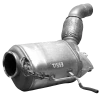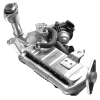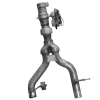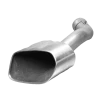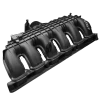Available stock
No products found in this category.
Helpful Information
This guide aims to provide 'general' information about BMW transmissions, such as common issues that we've encountered and tips on determining fitment compatibility.
Catalytic converters in BMWs are prone to clogging and contamination. This will affect exhaust flow, engine performance and fuel efficiency. Blocked units can sometimes be chemically cleaned, but more often than not need to be replaced.
Additionally, malfunctioning oxygen sensors, leaking fuel injectors, or misfiring spark plugs can also cause catalytic converters to overheat. And over time catalytic materials can simply just degrade.
The catalytic converter is an emissions control device integrated into the vehicle’s exhaust system. It uses a catalyst to convert toxic gases and pollutants from the engine’s exhaust into less harmful substances before they are released into the environment. The converter typically targets carbon monoxide, hydrocarbons, and nitrogen oxides, transforming them into carbon dioxide, water vapour, and nitrogen gas.
Each model generation can have multiple different types of catalytic converter—to account for different engines.
The best way to confirm fitment compatibility of a catalytic converter is to match the BMW part numbers from the catalogue. This can be done by decoding your vehicle’s VIN in a BMW EPC (electronic part catalogue.)
If you don’t have access to an EPC, provide our team with your vehicle’s 17-digit VIN—and we’ll check our stock for a compatible match.
Some catalytic converters are interchangeable between models with alike/similar engines, but they are often unique to a specific engine type within a model generation.
Contact us
Can't find what you're after? Don't know what part fits your car? Contact our sales team and they'll check our stock & provide you with a quote.

